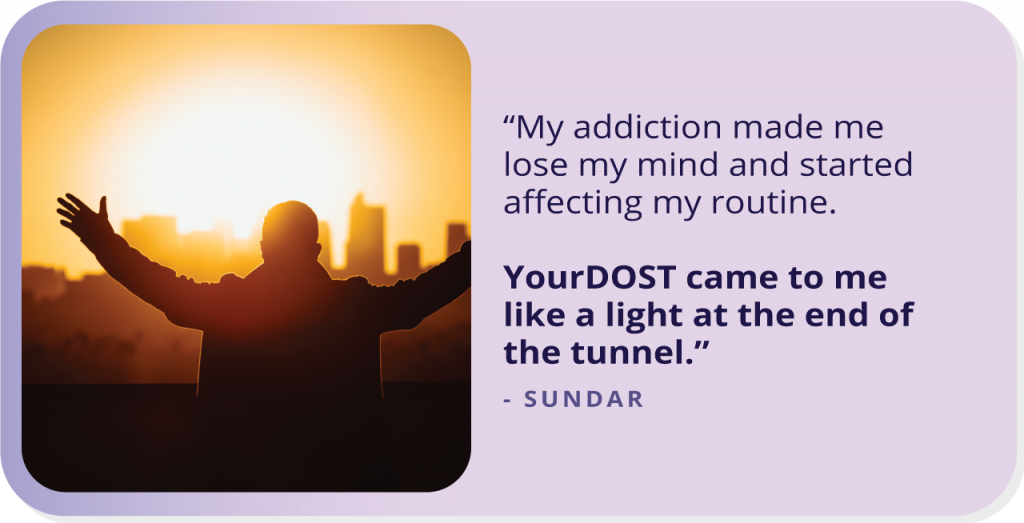10 Tips To Remain Alcohol Free Post Rehab
The transition from a rehabilitation centre to outside world can be a major change affecting all aspects of your life. A rehabilitation centre, with constant monitoring, is a rather protected environment with no other external forces coming into play. Coming back to the external environment is like stepping into a completely new life with a lot of aspects to handle like career, rebuild family relationships and other relations. As per research, the first six months after coming out of the treatment phase are the ones where most percentage of relapse takes place.
Here are some applicable tips which could help you maintain the recovery and progress towards a better life after coming from a rehabilitation centre.
1. Schedule a proper routine: At the rehabilitation centers, there is a schedule which everyone has to follow and there is proper monitoring for the same. After coming out of the rehabilitation centre, you should try to have a proper routine which proper time allotted for all productive activities one wishes to engage in. Make sure the schedule is not hectic or does not keep you too busy. It should aim to make your life easy. Also, take time to reflect on your feelings, and even to express gratitude. This can be done by making a list of what you are grateful for and even by expressing gratitude verbally like saying a heartfelt thank you to those who have helped you.
2. Set clear goals for yourself: Coming out of the rehabilitation centre is a chance to re-direct your life. Utilize this opportunity to discover your purpose in life and channelize your energy in that direction. Make sure you begin by discussing your goals with a counsellor, or someone close to you. The goals you set should be realistic and achievable.
3. Participate in group meetings: Multiple centres hold regular Alcoholics Anonymous based group meetings, and other type of group meetings also, for the people who have faced or are facing the same issue. These meetings serve as gentle reminder of how far you have come and can thus encourage you to keep moving forward without regressing. It acts as a medium to share your thoughts and feelings and also to learn from others. It helps in building a strong support network.
4. Be regular for follow-up sessions: Seen in a realistic way, there is no ‘happily ever after’. Recovery is a continuous process where one has to make efforts every day to stay sober. Regular follow ups at the scheduled intervals can help by proper discussion of thoughts and feelings; and also having a more secure feeling of being supervised or monitored when in need.
5. Engage in self care: Maintain a proper self care routine by taking care of your health and hygiene. Take proper nutrition, try not to skip meals. Also, make sure you take some exercise everyday. Yoga and Pranayama help maintain a sense of balance and internal well being. Pranayama and aerobic exercises like dancing, running, are known to curb cravings and might play a role in maintaining recovery.
6. Be open to receiving and applying productive suggestions: Being open to suggestions from your loved ones and other significant people like your counsellors and mentors can help to a great extent. It will also make you a person who is more flexible and free to make some positive changes.
7. Build stronger communication: Find the obstacles you have in communication with your loved ones as well as in other settings, and work on them. A lot of issues arise when there is no proper exchange of thoughts and continuous suppression leads to usage of substance to feel a sense of relief. This relief however, is temporary and the issues at the root of it need to be addressed in order to have long-term maintenance of recovery.
8. Help someone recover: Once you have recovered, it is a good option to help someone else also go through the phase of treatment and move towards recovery. Engaging in regular mentoring for someone else indirectly serves as a reminder for yourself to maintain your recovery and to apply the suggestions you provide to that person to your own recovery too.
9. Increase your social circle by adding sober people to it: Try to avoid staying isolated and instead, work towards enhancement of your social skills and keep yourself engaged in good company. Choose your friends wisely, and try to avoid company of individuals who use a substance be it alcohol or anything else. If you have such a friend, try to meet him/her only when he/she is sober, and not in situations and times when he/she is using or has used a substance.
10. Keep a check for any signs of relapse: The tricky part is that these signs vary from individual to individual and there is no rule or strict checklist for it. Some of the general signs are – too much stress or fatigue, feelings of being burdened, being too happy or overconfident, feelings of guilt, unrealistic goals and expectations, very abrupt reactions which might include anger and aggression, feelings of being a failure or incapable of doing anything, are all broader signs which one should keep a check on. Others’ around you can monitor this, but you need to be honest with yourself and monitor these signs and discuss about them with someone close to you or with your counsellor so that the issue can be resolved and recovery can be maintained.
All these tips can help maintain a steady growth on path to recovery and not regress back to relapse. Happy recovery!




